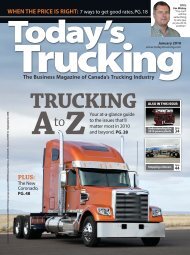Create successful ePaper yourself
Turn your PDF publications into a flip-book with our unique Google optimized e-Paper software.
They say trucking gets<br />
in your blood, and if<br />
you don’t believe me<br />
just look at the number of<br />
family-run carriers. From a<br />
tax-planning standpoint,<br />
there’s a good reason to hire<br />
someone in the family:<br />
income splitting, where you<br />
distribute business profits<br />
among family members who<br />
helped generate the returns.<br />
But if you’re putting your<br />
spouse, kids, or some other<br />
relative to work, paying a<br />
wage or salary, don’t forget<br />
you’re their employer. You<br />
may have some type of tax<br />
and legal obligations as you<br />
would if you’d hired someone<br />
off the street. These might<br />
include source deductions<br />
like Employment <strong>In</strong>surance<br />
and/or Canada Pension Plan.<br />
Then again, they might not.<br />
The Employment<br />
<strong>In</strong>surance Act states that<br />
employees who are related to<br />
their employer—be that a sole<br />
proprietor or corporation—<br />
may not be eligible for EI benefits<br />
and should not have EI<br />
premiums deducted from<br />
their pay. The <strong>In</strong>come Tax Act<br />
deems that related persons do<br />
not deal with each other “at<br />
arm’s length.” People who are<br />
connected by blood relationship<br />
(relatives of common<br />
descent, like a father and son),<br />
marriage, common-law partnership,<br />
or adoption are considered<br />
“related persons.” You<br />
also can be related to a corporation<br />
if you’re related to one<br />
or more of the people who<br />
control the corporation, or<br />
when a corporation employs<br />
Street Smarts<br />
To EI, or Not To EI?<br />
big money That tax deduction that’s sitting on your couch watching<br />
The Simpsons? Should he be paying into Canada Pension? By Scott Taylor<br />
someone who controls more<br />
than 40 percent of the<br />
corporation’s voting shares.<br />
On the other hand, some<br />
family employees might indeed<br />
qualify for EI. For example, a<br />
related employee may be<br />
insurable if it’s reasonable to<br />
conclude that you would have<br />
hired a non-related person to<br />
do the same job at a similar<br />
rate of pay. What is reasonable?<br />
Some considerations<br />
Canada Revenue Agency<br />
(CRA) would use:<br />
Remuneration. Is the pay<br />
you offer your related employee<br />
commensurate with what a<br />
non-relative would accept for<br />
similar work?<br />
Don’t try to arrange<br />
a haphazard<br />
payment formula<br />
or job description<br />
after your year-end.<br />
Employment terms and<br />
conditions. Are the terms and<br />
conditions of employment<br />
substantially similar to the<br />
ones in an arm’s length<br />
employment relationship?<br />
Nature and importance of<br />
the work performed. Are the<br />
services you hired your<br />
employee to perform<br />
necessary and important to<br />
the business operation?<br />
If you’re not sure whether<br />
to deduct EI premiums for<br />
your employee, you can ask<br />
Canada Revenue Agency to<br />
make a ruling on the case.<br />
Rulings are formal CRA decisions<br />
that cannot be reversed.<br />
They clarify your obligation<br />
as the employer, and your<br />
employee can be assured that<br />
if he or she is eligible to make<br />
an EI claim (due to lay-off,<br />
pregnancy, or sickness), coverage<br />
would not be denied.<br />
Either you or your employee<br />
can make the request by<br />
sending a letter or a completed<br />
Form CPT-1 to the nearest tax<br />
services office; you have until<br />
June 30 of the year following<br />
the year in which the employment<br />
occurred to send it in.<br />
Once a ruling has been<br />
requested, an authorized CRA<br />
officer will contact you or<br />
your employee. Sometimes<br />
the officer will ask for more<br />
information such as payroll<br />
records, copies of written<br />
contracts, or other related<br />
documents; so follow their<br />
instructions and be prepared.<br />
Once a ruling has been made,<br />
the officer sends a letter to<br />
the worker and the employer<br />
giving the reasons for the<br />
ruling. If you’ve already<br />
deducted EI premiums and<br />
the officer rules that you<br />
shouldn’t have, you have up<br />
to three years to request a<br />
refund of the EI premiums.<br />
Hiring family takes serious<br />
forethought and solid tax<br />
advice from someone who has<br />
experience with family businesses.<br />
Don’t try to arrange a<br />
haphazard payment formula<br />
or job description after your<br />
year-end. Put an employment<br />
agreement in place at the<br />
beginning of your fiscal<br />
reporting period outlining<br />
your decisions behind income<br />
splitting, and be ready to<br />
defend the value and worth of<br />
your family members’<br />
contribution to the business<br />
and to the bottom line.<br />
If you think the amount<br />
you’ve chosen to pay a family<br />
employee seems unreasonable<br />
for the job at hand, it<br />
probably is.<br />
For information about<br />
CRA’s rules regarding family<br />
employees, visit the Small and<br />
Medium-sized Enterprise Zone<br />
at www.cra-arc.gc.ca and click<br />
on “payroll deductions.” ▲<br />
Scott Taylor is Vice President<br />
of TFS Group of Waterloo, Ont.<br />
For more information visit<br />
www.tfsgroup.com or call<br />
1-800-461-5970<br />
MARCH 2006 35



